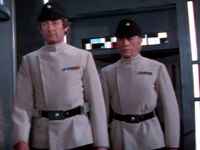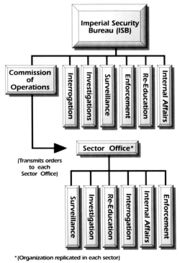Imperial Security Bureau/Legends
- "We're the Imperial Security Bureau. What we say is principle; what we decide is regulation; what we do is law."
"And whoever you order shot is dead?"
"So you do understand." - ―Drelfin and Daric LaRone
The Imperial Security Bureau (ISB), the public branch known as Imperial Security Services or simply Imperial Security, still known as the Internal Security Bureau during the transitional period, was a law enforcement and internal intelligence organization of the Galactic Empire under Galactic Emperor Palpatine. Based in the massive ISB Central Office on Imperial Center, it was separate from, larger than, and often rival to Imperial Intelligence.
History
The Imperial Security Bureau was formed in 19 BBY by Crueya Vandron.[1] Its forerunner, the Internal Security Bureau,[4] was combined with elements of the fanatical Commission for the Preservation of the New Order, formerly the Commission for the Protection of the Republic,[1] and the Coruscant Security Force's Anti-Terrorism Unit and detective units.[5] Vandron formed the organization to keep an eye on Imperial Intelligence and to ensure that the New Order's ideals were carried out.[1] Ironically, several of the CSF officers transferred to the ISB were not enthusiastic about Palpatine or the New Order.[5]

The ISB stationed moles among the officers of all capital ships in the Imperial Navy; their duty was to report on any possibly treasonous activities or sentiments present among others of the ship's crew (especially the commander), and to execute them if they acted upon them. The ISB served more of a police function than Imperial Intelligence, with a more public presence; ISB operatives were not afraid of identifying themselves, and maintained an overt force of Operations Ships to make arrests. The ISB also was responsible for wiping out any memories of the Jedi Order. They destroyed the collection of Jedi antiquities on Obroa-skai. In large part because of their role as the Empire's secret police, the ISB was largely hated by members of the Imperial Military despite having an official working relationship with them, due to the fact that they constantly had to look over their shoulder.[9]
Even though several key ISB members, such as Colonel Wullf Yularen, died aboard the first Death Star when it was destroyed over Yavin, the ISB continued to be a strong political faction within the Empire as evidenced by ISB Central Commander Sollaine making a bid to replace Darth Vader at the Emperor's side shortly after Executor was finished. Such was his power that he commandeered Vader's old flagship, Devastator, to track down the important Imperial turncoat, Rivoche Tarkin.[2]
After the death of Palpatine at the Battle of Endor, the ISB along with other Imperial factions devolved into the Imperial Civil War. Specifically, the ISB and Imperial Intelligence initiated a campaign of assassinations against each other that annihilated much of both organizations' leadership. By the end of the civil war and the Imperial Reunification under Admiral Natasi Daala, the ISB had dissolved.[7] A successor agency, Imperial Security, was later formed to serve as a security force for the Imperial Remnant.[10]
Organization
- "The Imperial Security Bureau operates in parallel with Imperial Intelligence and many of its functions overlap with those of its 'older brother.' Yet the ISB is a recent organization, founded under the auspices of the New Order. It exists to ensure ideological consistency within the Empire's internal operations. The agents of the ISB are essentially the Empire's secret police."
- ―Admiral Wullf Yularen, Imperial Handbook: A Commander's Guide

Commission of Operations
The Commission of Operations was responsible for passing on the directions of the Central Office directly to the Sector Officer for each of the various ISB branches. All coordination between the different branches within a sector, or between Bureau resources in separate sectors, was dictated by the Commission of Operations.
Surveillance
Surveillance was the largest branch of the ISB, with nearly 35 percent of all personnel in the Bureau. The quality of agents in Surveillance, however, was not always great. A good portion of Surveillance agents were candidates straight from the Sub-Adult Group, but these were poorly trained, albeit eager and promising. The rest were made up of properly trained CompForce Observers, agents from Progress's Sector Monitor, Improvement's Sector Development, and local contacts aiming to subvert other local powers.
Surveillance was tasked with uncovering beings or activities helpful to the Rebel Alliance or that may obstruct the Empire's plans. Many of Surveillance's targets were later turned over to Investigations for more thorough action. Surveillance was also responsible for instilling fear of the Empire into its citizens, so that they would think twice before assisting the Rebellion.
Investigations
Investigations was the skillfully superior branch of the Imperial Security Bureau, when compared to Surveillance. Many Department of Modification agents and proven agents from Surveillance made up Investigations. Agents of Investigations were always in direct communication with the Imperial military, allowing them to call on a massive amount of firepower and resources should the situation require it, so they could take down Rebel threats with considerably faster response time and effectiveness.
Internal Affairs
The Internal Affairs branch was the group responsible for watching COMPNOR, Imperial Personnel, and the citizens of the Empire, another example of multiple layers of control and authority overlapping one another in the Galactic Empire. Science, Commerce and Justice groups within the Coalition for Progress, and the Enforcements branch of the ISB, were all key targets of Internal Affairs.
It is unknown whether or not the Internal Affairs division had the authority to monitor the Select Committee, though it is known that they did not consider the Select Committee to be above suspicion.
Due to COMPNOR's ambiguity in regards to rules and procedures for policing its own members, Internal Affairs was able to take advantage of the situation to expand their power. Affairs agents were isolated from the rest of COMPNOR and had thus developed their own jargon and their own interpretation of the New Order. Other branches of COMPNOR complained about the autonomy of Internal Affairs and their actions, but neither Crueya Vandron nor Emperor Palpatine ever made attempts to stop it, as they apparently supported the work of Internal Affairs.
Internal Affairs called their field agents "keyns", while they called their investigative staff "dirtbugs". The division also developed their own collection of terms to differentiate between the ways they conducted a specific investigation.
To "audit" was to conduct an investigation in which the target and everyone around him knew the investigation was being conducted.
"Finesse" was conducting an investigation by asking the target's help in rooting out other traitors in the hopes they would give away incriminating evidence in their eagerness to point the finger at others.
"Scattering" was the method of grabbing someone whom you had no evidence of foul play of, and then observing the behavior of the person's associates to see if any of these react in suspicious ways.
"Crustbusting" was the method of harassing a suspect in the hopes he would do something criminal.
"Cultivation" was the method of allowing a suspect with only minor wrongdoing to proceed unhindered so agents would catch the suspect and any associates in a larger crime, and "irrigation" was covertly staging events so a "cultivated" suspect would have a greater opportunity to commit a larger crime.
Finally, to "Jabba" was to set a suspect up in a no-win situation in which he must commit a crime. The Internal Affairs agent would then promise to forgive the crime if the suspect did a few favors; favors which inevitably caused the suspect to commit some other crime. This ensured that the subject would be permanently indebted to the ISB.
Interrogation
- "The challenging part of collecting data comes when the data's owner doesn't want to give it up."
- ―Unidentified ISB agent
If a subject caught by Investigations was suspected of still hiding the information the ISB wanted to know, the subject was shipped off to the Interrogation branch. The information they uncovered was sent to Investigations. The interrogation branch was known for using any and all interrogation methods at their disposal, such as direct questioning, drugging, and torturing victims. Curiously, the subject/victim of the interrogation was never seen again. It is unknown whether they were killed, or left in prison.
Re-Education
When a member of COMPNOR was convicted of a crime by Internal Affairs, the subject was transferred to Re-Education. The subject was usually always returned to COMPNOR, although in a position of lower importance. It was reported that these individuals acted strangely when returned, their conversation disjointed, and their emotions out of phase with the situation. They were called "Graduated of Re-Education" or "Re-education" officially, but amongst other members of COMPNOR, it was said they were "Re-brained".
Enforcement
The Enforcement branch provided specialized muscle for the ISB. They occasionally operated for Internal Affairs, but most often they were working for Investigations. Enforcement was the only division within all of COMPNOR that hired beings who were not members of COMPNOR, which earned the suspicion of the Internal Affairs division, who were worried the use of unindoctrinated personnel was too risky.
Nevertheless, Enforcement was thus able to increase the amount of available talent, and perform operations the Select Committee would rather not be performed by COMPNOR members. In addition, Enforcement did its best to protect its operatives from unwarranted interferences from the Internal Affairs division, though a permanent tension existed between the two groups that no one could avoid.
ISB stormtroopers
The ISB had its own stormtroopers that operated outside the command structure of the Stormtrooper Corps. As they wore identical armor to that of regular stormtroopers, they were sometimes used to infiltrate standard units of stormtroopers to ensure their loyalty and the execution of their orders. A good example of this was an attack against Rebel sympathizers on Teardrop in 0 ABY, where ISB stormtroopers noticed that stormtrooper Daric LaRone was deliberately not shooting civilians. They were also more questioning of their orders than standard stormtroopers, as shown when two ISB stormtroopers betrayed the Emperor's Hand Mara Jade, while she was infiltrating a pirate base on Gepparin. They were often attached to ISB tactical units.[8]

Behind the scenes
The ISB has several accounts of its founding and this article treats the various sources as complementary. These accounts include the founding by Crueya Vandron according to the Imperial Sourcebook, the Internal Security Bureau as the ISB's forerunner according to The Complete Star Wars Encyclopedia, and the ISB being formed from chunks of the CSF including detectives and the Anti-Terrorism Unit according to Imperial Commando: 501st.
Appearances
Sources
Non-canon sources
Notes and references
- ↑ 1.00 1.01 1.02 1.03 1.04 1.05 1.06 1.07 1.08 1.09 1.10 1.11 Imperial Sourcebook
- ↑ 2.0 2.1
 "Small Favors" – Star Wars Adventure Journal 12
"Small Favors" – Star Wars Adventure Journal 12
- ↑ Star Wars: Dark Forces
- ↑ 4.0 4.1 The Complete Star Wars Encyclopedia
- ↑ 5.0 5.1 5.2 5.3 5.4 Imperial Commando: 501st
- ↑
 "Republic HoloNet News Special Inaugural Edition 16:5:241" – Star Wars Insider 84
"Republic HoloNet News Special Inaugural Edition 16:5:241" – Star Wars Insider 84
- ↑ 7.0 7.1 The Essential Guide to Warfare
- ↑ 8.0 8.1 Allegiance
- ↑ 9.0 9.1 Star Wars: Imperial Handbook: A Commander's Guide
- ↑ Fate of the Jedi: Backlash
